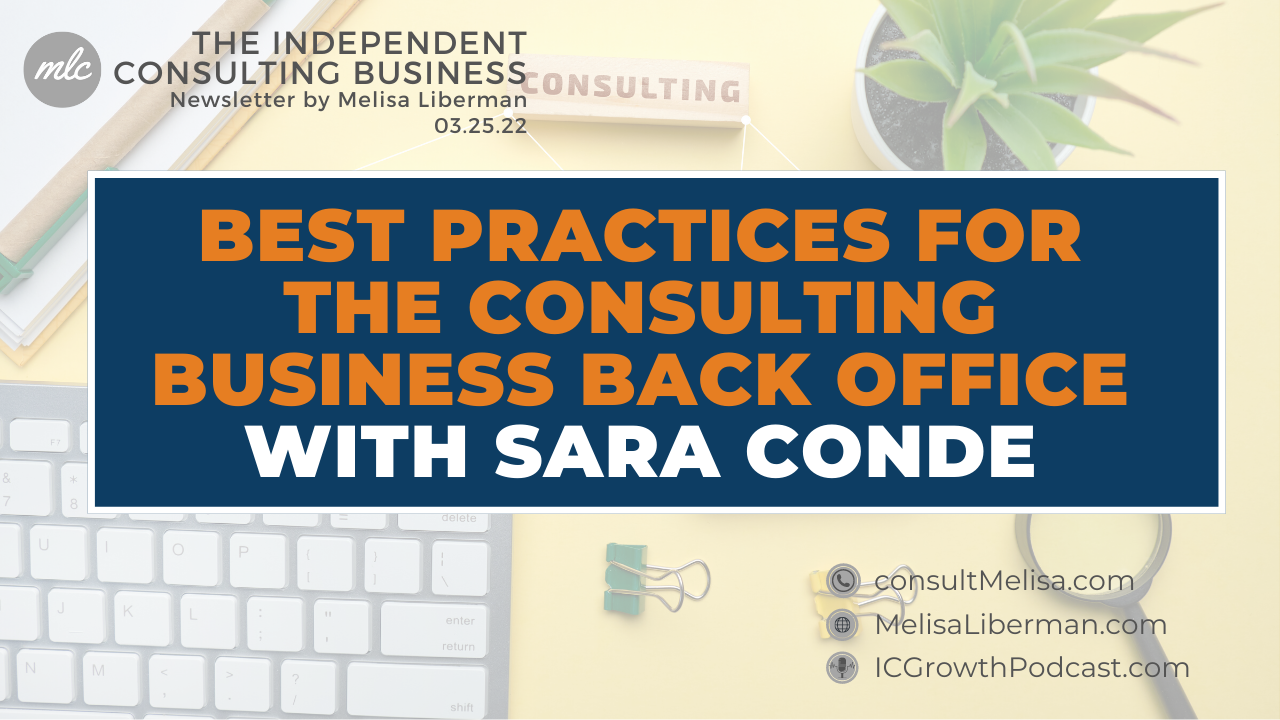Best Practices for the Consulting Business Back Office with Sara Conde
Apr 01, 2022
Estimated Reading Time: 19 minutes
Download the article as a PDF:

Introduction (from Melisa)
I'm so excited to share with you an interview that I recently did with Sara Conde. She is the Head of New Business at Collective. Collective is a financial platform that's designed to help self-employed people take the burden of the back office off of their business.
Sara's been in this space for 15 years helping independent consultants in one way or another. And over the course of her career, she's amassed so much knowledge about best practices related to running a consulting business. And she shares those with us today.
In this interview, Sara shares:
- back-office best practices for the independent consultant,
- financial best practices,
- tax best practices,
- insurance best practices, and
- what she sees as the future of independent consulting.
Sara gives a really important perspective on what it means to run a consulting business versus to be a consultant and have a business. There's such a difference there.
So this interview will hopefully help you get further into that business owner mindset that we talked about so frequently in this newsletter.
Sara's Introduction
Sara: Melisa, thank you so much for having me. It's lovely to be here. My name is Sara Conde, and I am the Head of New Business at Collective. We are a company based out of San Francisco. We help independent consultants with their back office, everything from bookkeeping, to entity formation, to payroll, to filing taxes, and to back-office services.
I've been working with independent consultants for over 15 years now. It's my passion. I've gotten to know wonderful people like you and supported them in their businesses. So, I'm just thrilled to be here to speak to your community and offer any guidance and tips that I can.
Tell us about Collective and how it helps independent consultants
Sara: As you know, Melisa, when you go to start off as a business of one, you don't have a team that you can really go to get started. There are so many great tools and self-service out there. But it's hard to know which is right for you.
And then, if you find the right thing, then you're spending non-billable time doing those things.
So there's a statistic from Forbes that says freelancers waste 30 days a year doing back-office activities. This was, namely, billing and bookkeeping and filing taxes.
And then, you know, to do that correctly, both on the federal and state level, it's quite a lot.
A lot of the tools are designed for enterprises and aren't designed for businesses of one or small businesses. They're either not priced in line with your margins, or they're very heavy-handed for what you need.
This is what Collective is all about.
We give independent consultants the time and freedom to focus on what matters by taking care of their back office, everything from incorporation to accounting, bookkeeping, and tax services, in one platform.
Why does Collective focus on the independent consulting space?
Sara: Businesses of one are consistently underserved. We have 57 million freelancers contributing a trillion dollars to the global economy. And in 2019, 53% of Gen Z workers were self-employed. When we think about that, that's nearly double the number of freelancers than all the employees at Fortune 500 companies combined.
So often we think about our workforce as Fortune 500 employees. That's what comes to my mind, and I've even worked in this segment for a long time. But when you think about there are double that amount of freelancers.
What do you see as the missed opportunities that you see most independent consultants overlooking?

Sara: I see people going to the extreme ends of this.
On one end, I see people kind of check out and just give it to a CPA or financial advisor and not really understand the business.
And I really recommend, you know, you don't have to be your accountants, you didn't go into business to do that. But there's a difference between being financially empowered and being an expert in tax law and finance. It's important to partner with experts but to still have ownership of it. Because in the end, nobody cares more about your business than you. And it's important that you understand and can take experts' advice, but evaluate that and really understand it.
And then on the other side, I see people, because they're so smart, and they've gone into independent business now, and they've had a lot of success, they think they can do everything on my own.
This stifles them from growing and scaling their consulting business because they have to control every piece of it. It gets hard to bring in a vendor to help them or a subcontractor to do any of this.
And it's all in their heads, or it's not documented well. And then they run into trouble.
So I would say there's a balance, and you want to find that way where it's your company, you're in charge of it, you have control, but you're putting in strategic partnerships, that tools, technologies, services, to really make a platform for your business, but you really want to be clicked in but also accept help.
What specifically does it look like to be a consulting business that's financially empowered, but not owning it all?

Sara: I would say:
- you're reviewing the reports that your CPA gives you,
- you're asking questions when you don't understand something,
- you're meeting with them regularly,
- you're engaged, and
- you're not just kind of saying, "Oh, I don't know. Ask my CPA because I don't know anything about that."
You should be understanding and repeating back and making sure that you at least understand the one-on-one parts of it.
As I said, you don't have to be an expert in tax law or all the rules. But be engaged, ask questions, and have somebody who's going to treat your business like a priority as well.
One of the questions that I get frequently is how to find affordable insurance as someone who's employed, what would you recommend around that topic?
Sara: Right now, I tell people, there are three things you can do.

- Number one, you have a spouse that has employer coverage, that's always going to be your best option is to go with the employer plan that maybe your spouse has or your partner has.
- Number two is to continue with COBRA, which is what you used to have from your employer. So it's the employer and the employee side of Premium Plus that 2% charge for the maintenance of that, and you can keep that for 18 months. There are a lot of ways to write off those expenses, again, if you're working with the right person really understands independent consultants.
- And then the third is you can go to the exchange. We all know that there's an exchange, right, so that's the federal or state Marketplace.
But then there are also some really cool disruptors that are coming up in this industry. One is Decent. They're in Texas and they are specifically doing plans for independents.
Also Freelancers Union.
But I would say don't spend too much time on it, because you have to charge to cover this because the news is not great right now. So the most important place to think about this as factoring into your bill rate in the first place because it does fall on you in a way that it does not for employees, and even for employees.
Speaking of rates, what do you recommend an independent consultant take into consideration when setting their rates?
Melisa: What I find so often is we talk ourselves out of things like, I'm not qualified yet to charge this amount, or I'm not qualified yet to do value-based pricing or all of these things that we have these internal dialogues going on.
And really, at the end of the day, it's that self-doubt running the show.
Instead, really looking at yourself and asking:
- What do I have to offer?
- How can I help these clients?
And give yourself the benefit of the doubt to keep moving forward. So I've done a few episodes on that. I think they're episodes 50, 51 and 52. So if you feel like you don't know what to charge, or you can't charge enough to cover insurance, go back and listen to those because you're probably undermining your own worth
Sara: When I went out to do my first bill rate, I had helped hundreds and hundreds of independents of their own. But it was very different once it was my own LLC. I found that I really needed to kind of benchmark it with my coach and with people in my network:
- Does this feel about right?
- Can you help me?
Because it's emotional. You're very exposed, and you're putting yourself out there.
And I think we tend to be, especially women tend to say, "I can't." When in fact, you just need to have a little research behind it so you can validate it. Once you do, you'll see that you are worth it.
Are there any other challenges that you see independents facing right now and what they might do to overcome those?
Sara: I think with not knowing where to go to get the right help.
So CPAs are wonderful. And they can be very helpful, but they are expensive as someone you can call all the time.
Some people can't afford to have that really high-end, personal touch; they may have other assets, they may work with a financial advisor that's part of their network. And that's great.
However, if you can't afford that, it's hard to find, and you don't have a lot of assets for someone to manage on a percentage basis, it is sometimes difficult to find that right level of care.
Also, you want to find somebody who actually works with independents and understands it because it is different. Just like there are lots of types of consulting, there are lots of types of CPAs that focus on many different things. And it's important to find someone who works with independents.
You want to implement a repeatable process where you're reviewing the data and getting that repeatable process down for the financial side of your business. You want to be looking at your
- profit and loss statements.
- how you're spending your time.
It's building those good financial habits, they will really pay off in the end, and they're vital to having a successful practice.
I think it helps also just to have that kind of cadence going so you're thinking about your business as a business and really building up that side of your mindset, versus the way that you thought about money as an employee and the paycheck we're regularly getting and that kind of thing.
It's just such a different beast, as we're consultants and dealing with ups and downs and cash flow. And yes, you're able to have the proactive line of sight that can help with much more powerful decision making versus in-the-moment working off of how are you feeling about your bank account balance.
Tell me more about what you see in terms of employee mindset vs. business owner mindset.
Sara: Yeah, you want to be, again, just being mindful and making those strategic financial decisions; you can't be strategic if you're just surviving every day and moving on.
And let's be real. When we get onto our client projects, we can get it twisted and think that their company is more important than ours. We're so used to that as an employee mindset, we always have to be thinking about it as this is my client and of course, it's important to give excellent service and build a reputation because referrals are still the best way to get business. But if you're sacrificing your own business, it'll impact you in the long run.
You have to prioritize your business ops, your finance, your workflows, and invest in the right suite of services, tools, and technologies because it does make a big difference.
And make it a little bit bite-size, one piece at a time.
If you could give one piece of advice to independent consultants, what would it be?
Sara: I think the last thing I would say about independence is to know how valuable you are. Consulting is no longer a filler for your resume.
It's completely flipped.
So I think the independent should be empowered that they're going to find more and more businesses and services out there that are customizing for them because they are driving the biggest economic change in this country and globally. It's just an amazing thing.
So it's a great time to be independent.
The sky is the limit so I would say the concept is you need to focus because there's so much out there. Work with a coach, find what works for you work with their suite of tools. And don't drive yourself crazy because you'll be researching all day long.
Where can independent consultants find more about you and Collective?
Sara: I would encourage to check out Collective and the tax calculator on our site.
To try Collective at a discount.
- https://www.collective.com/promo/MLCOACHING
- One month free if you sign up and use code MLCOACHING
And, my LinkedIn profile is https://www.linkedin.com/in/saracasoconde/. I love to connect with anybody out there. Just say hello.
Thank you to all your audience and to you for having me. It's been so much fun to be here.




